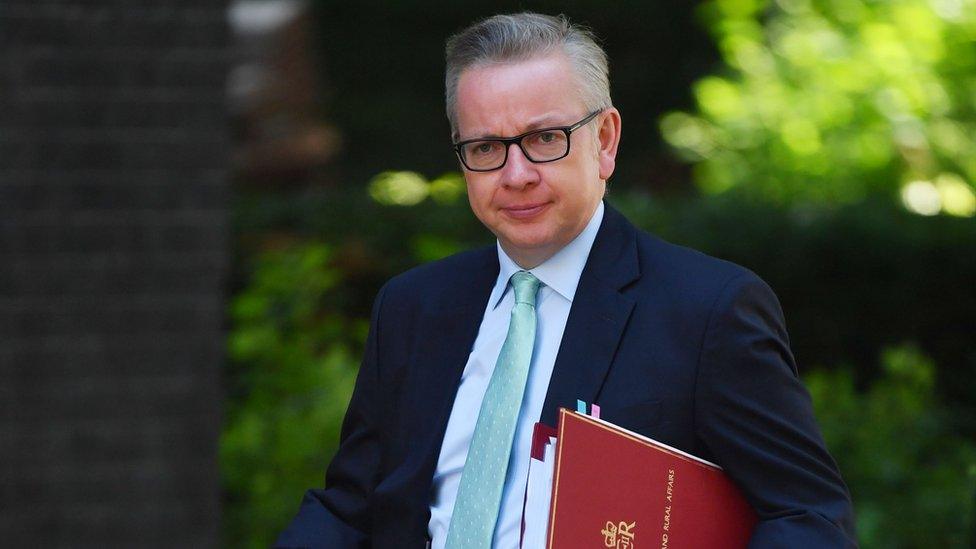Brexit 'will enhance' UK wildlife laws - Gove
- Published

Mr Gove was announced as the new environment secretary following the 8 June general election
Any Brexit changes to the UK's wildlife laws will increase - not reduce - environmental protection, Michael Gove has pledged.
The new Environment Secretary said he wanted to enhance current rules safeguarding Nature wherever possible.
He said he would discuss shifting the use of farm grants after 2022 in order to enhance the countryside.
Environmentalists welcomed his promises, but some are sceptical whether they will actually be met.
Mr Gove made his comments to BBC Farming Today.
He reassured farmers that there would be no race to the bottom on agricultural standards. The UK will compete on quality, he said.
"Two things are critically important: we need to maintain, and where possible, enhance environmental and animal welfare standards. We have a good track record on both areas and don't want to see either of them diluted or eroded."
Mr Gove, who once described himself as a "shy green", is clearly seeking good relations with environmental groups during Brexit.
Change for the better?
During his time as a back-bencher, he expressed the view that EU laws protecting the heaths in his Surrey constituency should be diluted because they put up the cost of housing.
And previously, as a minister, he tried to take climate change off the geography part of the school curriculum and blocked the then climate minister Amber Rudd from attending international talks.
Mr Gove said he had been in discussions with the RSPB, and wanted to offer an assurance about any Brexit change in EU laws.
"It may well be that we change operation of particular rules," he said. "But any change will be designed to ensure we get better protection for the environment."
He continued: "While the EU has often been a force for good in raising environmental standards, some of the means haven't necessarily been the most effective regulatory tools - so getting those right will be critical to Brexit success.
"There's a huge opportunity to design a better system for supporting farmers, but first I need to listen to environmentalists about how we can use that money to better protect the environment… and also to farmers to learn how to make the regime work better."
The RSPB said their meeting with Mr Gove was encouraging. Their spokesperson Martin Harper said: "He asked the right questions, took notes and listened. These are good signs.
"Without keeping and strengthening existing environmental regulations the government won't be able to achieve their manifesto commitment 'to pass on the environment in a better state to the next generation'."
Others were more sceptical. On reading Mr Gove's pledge to improve wildlife protection, Kate Parminter, Liberal Democrat environment spokesperson, tweeted: "Has he put that on the side of a bus, too?"
Important questions
Tom Burke, from the green think tank e3g, warned that Mr Gove must deliver actions, not just words. He called on the Environment Secretary to explain how Natura 2000 wildlife sites currently protected by the EU would be safeguarded in future.
These sites form the largest coordinated network of protected areas in the world and, currently, member states have to discuss any plans to develop them with Brussels.
"Watch what Gove does, not what he says," Mr Burke told BBC News.
"How will he translate the EU Habitats Directive into UK law? Who can environmentalists appeal to if the government allows development in a sensitive site? That's a key question.
"I suspect Gove has been given a remit to ensure that the environment doesn't become an issue in Brexit talks. But that could mean that anything that might be controversial gets buried under a torrent of fudge."
But the Times newspaper columnist Matt Ridley urged Mr Gove to stand firm on re-shaping unnecessary rules.
He wrote: "The current obsession of the environmental pressure groups is that there must be no 'watering down' of environmental designations after Brexit.
"Mr Gove should demand that environmental policies are judged by their results, not their intentions. In fisheries, air pollution, tackling invasive species, reforming farm subsidies, wildlife conservation, badgers, landscape protection, genetically modified food and pesticides, what counts is not the size of the budget going, the moral motive behind it, or the number of committees overseeing it — but whether it gets results."
Mr Gove said he would look again at scientific evidence on the badger cull, but said there would be no change to policy.
On seasonal farm labour, he surprised some political commentators by saying: "There's an absolute commitment from the prime minister and from all of us in cabinet that when it comes to shaping new migration policy the economy comes first."
Follow Roger on Twitter., external